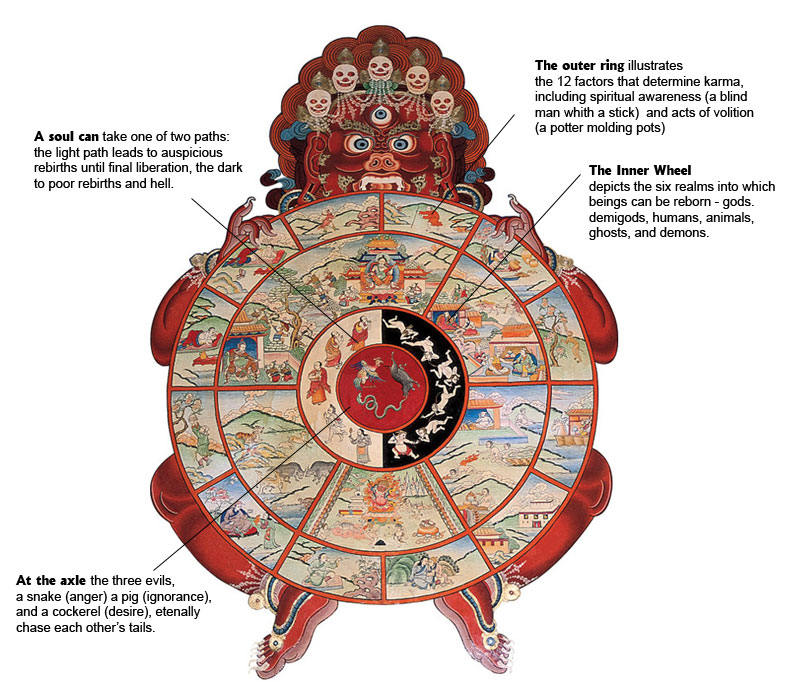According to Buddhists, intention is important, but it is also the actions of thought and deed, which govern the nature of the future; in Buddhist terminology, such action is called Karma. The accumulations of Karma, both personal and collective, turn the so-called “Wheel of Samsara,” propelling each of us and society itself through cycles of experience ranging from overtly pleasurable to thoroughly horrifying.
In traditional Buddhist teachings, Samsara is divided among six “realms” of rebirth based upon Karma – God, Jealous God, Human, Animal, Hell, and Hungry Ghost – each imbued with its own particular qualities. In more contemporary terms, these realms may be viewed as psychological states through which we traverse and are reborn by the minute, by the hour, by the day and by the lifetime.
For example, upon awakening we might feel delighted with life and ourselves but upon discovering the daily paper has not arrived quickly become angry and blaming; this can be viewed as waking up in the self-satisfied God realm and suddenly finding ourselves stewing in the anger-filled Hell realm. Or we might be reviewing our stock portfolio online, feeling like we’re getting closer to financial security and success, only to see that the markets have collapsed and become a source of fear; in this case we have traversed from the envious Jealous God realm to the fear-filled Animal realm. So it goes, minute after minute, day after day. Thus collectively, Karma forms a matrix of unfathomable complexity.
That unfathomable aspect aside (and understanding necessarily requires teasing out the threads of Karma’s Gordian Knot), our local affordable housing dilemma is an emergent property of Sonoma’s Karmic turning of the Wheel of Samsara. For those who spend a lot of time in the God realm, housing is an adornment of status, a mini-mansion-palace appropriate to their station. For those Jealous Gods who aspire to the mini-mansion, housing is a mere stepping stone to something bigger and better. Those living in the Animal realm are home renters, constantly in fear of eviction and homelessness, while the Hell realm includes those with no home at all, living under bridges or in cardboard boxes on the street. The Hungry Ghosts, no matter the home – unable to satisfy their incessant thirst and hunger for more money and property – suffer in a particularly unpleasant realm. Finally, for those of the Human realm home is where the heart is, be it ever so humble.
The inhabitants of the God realm think that everyone wants to join them; they can’t imagine why anyone would not. Powerful and influential, they push policy in directions appropriate to their own inclinations. They are joined by the adherents of the Jealous God realm; they want what the Gods have, and oppose those who would deny them. The renters of the Animal realm are too afraid to become active; low paid or on fixed incomes they are inclined to hide and to be quiet. The residents of the Hell realm, the cast-offs of society, in turn victimize each other and defend their territory in the cover of night. Hungry Ghost inhabitants roam the other realms in disguise, sometimes for example, appearing like a God but inside seething with insatiable dissatisfaction. Those of the Human realm know that mere circumstance divides their living situation from all the others and thus make room for compassion, generosity and effort towards crafting housing solutions for those less fortunate.
And so The Wheel turns.

Thankyou.
This is a clear conversation about how the mind creates the imagination of struggle. Of suffering. Now, I hope to soon read an as well description of the path to end suffering.
I am loving the esoteric explanation of our local sturm und drang housing situation. I believe that this could be applied to a number of other areas including business (read winery) development, hotels, new “community” sport complexes and the gradual eating away and “improvement” of greenbelt areas, which serve as natural buffer zones which produce oxygen, physical and psychological well being, and wildlife living environments and migration corridors.
Well, Giulia, this view is easily extended to all the topics you note; our world reflects the organizational matrix of our consciousness in all its confusion and complexity. Thanks for your comment.